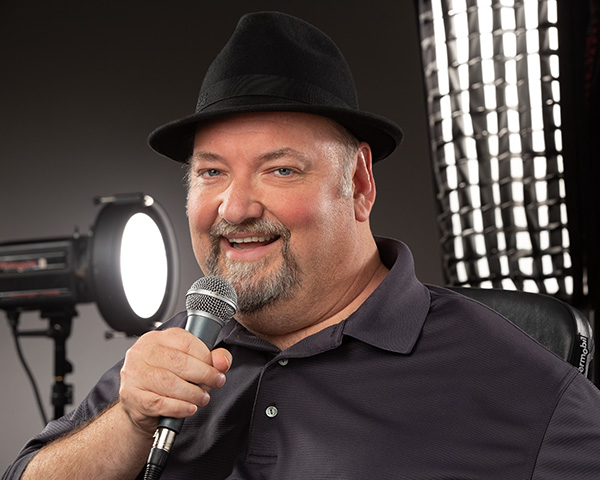Interview with David Dauber

Every week, we meet with audience members with disabilities who are willing to come forward and share a little bit about their own personal journey and experiences, attending live, in-person, or virtual speaking or training events. Through their unique and generous perspectives, speakers, trainers, facilitators, and other communication professionals can hopefully learn about some of the things that they do well, but also (and maybe more importantly) about some of the things they could improve to provide an experience that is truly inclusive of everyone.
Meet David, an audience member who has cerebral palsy and uses a wheelchair
So without further ado, let’s dive right into this week’s interview with David Dauber (he/him). David has cerebral palsy, uses a wheelchair, and comes to us from Texas, USA.
Introductions
QUESTION 01 Can you tell us a bit about yourself, and how your disability might impact your experience, as someone who attends live in-person and virtual events?
I was born in a small Kansas town smack dab in the middle of the United States. But that’s not my disability. I was born 18 years before the Americans with Disabilities Act (ADA) was signed. That’s not my disability either, but it did help me learn the value of accessibility. I’ve used an electric wheelchair all my life to get around, due to being born with Cerebral Palsy (CP), which limits the use of my arms and legs.
Having to use a wheelchair does not slow me down. In fact, it’s the true tool that keeps me actively doing all the things I like to do, acting on stage and on camera, hosting and producing a television/web show, speaking at conferences, and most importantly, being a husband and father to my family.
Things that ruin the experience
QUESTION 02 Thinking back on some of your experiences attending in-person or virtual events, what are some of the worst things speakers, trainers, and other communication experts can do to ruin your experience as an attendee?
Showing me to the back door, as the only entrance a person using a wheelchair could use going into an event. Not only was it at a church that advertised, “welcoming to all people…”, but it was a new building. While the building may have been accessible, the “welcoming experience” was truly stifled by entering the event from behind the curtain.
I also attended a training that asked for volunteers to come on stage and share their experiences. I raced down the center aisle only to find out there was no way for me to get up onto the stage. While I still shared my experience, I was simply a voice coming from the darkened front row.
Things that make a positive impact
QUESTION 03 Can you share some of the great things speakers, trainers, and other communication experts sometimes do that make a positive impact on your ability to fully enjoy your in-person or virtual event experiences?
When attending an in-person event, I like to be able to choose where I sit. That seems like a very minor thing, but to me having that choice is important. I am often escorted to a section where everyone that uses a wheelchair is seated in a nice little line (usually in the back). As a person that uses a wheelchair, I always hope that the event I’m going to is in a place I can:
- Get in the building,
- Have a choice where I sit,
- Sit where I can see the stage,
- Get onto the stage if I happen to be the presenter or asked to participate in the presentation,
- Go pee (accessible bathroom).
Sharing a piece of advice
QUESTION 04 If you had one piece of advice to give speakers, trainers, and other communication experts, so their content became more inclusive of people who have disabilities, what would it be?
Know your audience. This is the most important thing you can do, even before preparing your training or speech. If you want to create a message that will resonate with your audience, you need to know what they need (not only mentally but physically). If it’s possible, ask your audience before the presentation if they need accommodations for accessibility and, if so, what.
Wrapping up
QUESTION 05 Thank you for sharing some of your insights with us today. As we wrap up our conversation, is there anything that you’d like to add, such as another thought, another piece of advice, another perspective, etc.?
Always remember that everyone, regardless of disability, can experience cognitive overload. Mix it up a little. Give the information you need to present, tell personal stories, take poles, ask questions to your audience, and remember to give breaks.
Connect with our guest on social
Interested in knowing more about our guest this week? You can follow David on LinkedIn and Twitter.

About Denis Boudreau
Denis Boudreau is a consultant, trainer, and speaker specializing in digital accessibility and disability inclusion. He works with organizational leaders who want to equip their teams with the skills to create accessible websites and digital products – so no one is left behind. A Certified Professional in Web Accessibility (CPWA), Denis has trained thousands of web professionals over the past 20+ years and delivered hundreds of workshops in both English and French. He has helped leading brands like Netflix, Salesforce, and Victoria’s Secret embed accessibility into their digital strategies, empowering them to meet legal obligations, improve user experience, and connect with more people, more effectively.
